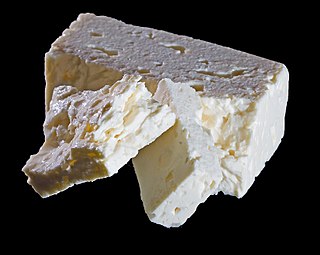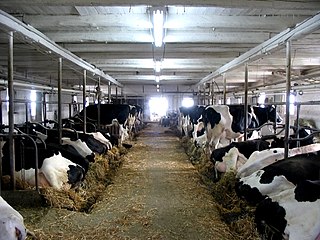Related Research Articles

Cheddar cheese is a natural cheese that is relatively hard, off-white, and sometimes sharp-tasting. It originates from the English village of Cheddar in Somerset.

Milk is a white liquid food produced by the mammary glands of mammals and the caecilian Siphonops annulatus. It is the primary source of nutrition for young mammals before they are able to digest solid food. Immune factors and immune-modulating components in milk contribute to milk immunity. Early-lactation milk, which is called colostrum, contains antibodies that strengthen the immune system and thus reduce the risk of many diseases. Milk contains many nutrients, including protein and lactose.

Pasta is a type of food typically made from an unleavened dough of wheat flour mixed with water or eggs, and formed into sheets or other shapes, then cooked by boiling or baking. Unlike noodles, pasta was traditionally only made with durum, although the definition has been expanded to include alternatives for a gluten-free diet such as rice flour, or legumes such as beans or lentils. While noodles are believed to have originated in Asia, pasta is believed to have originated in Italy and is a staple food of Italian cuisine.

Yogurt is a food produced by bacterial fermentation of milk. Fermentation of sugars in the milk by these bacteria produces lactic acid, which acts on milk protein to give yogurt its texture and characteristic tart flavor. Cow's milk is most commonly used to make yogurt. Milk from water buffalo, goats, ewes, mares, camels, and yaks is also used to produce yogurt. The milk used may be homogenized or not. It may be pasteurized or raw. Each type of milk produces substantially different results.

The illegal drug trade, drug trafficking, or narcotrafficking is a global black market dedicated to the cultivation, manufacture, distribution and sale of prohibited drugs. Most jurisdictions prohibit trade, except under license, of many types of drugs through the use of drug prohibition laws. The think tank Global Financial Integrity's Transnational Crime and the Developing World report estimates the size of the global illicit drug market between US$426 and US$652 billion in 2014 alone. With a world GDP of US$78 trillion in the same year, the illegal drug trade may be estimated as nearly 1% of total global trade. Consumption of illegal drugs is widespread globally, and it remains very difficult for local authorities to reduce the rates of drug consumption.

Feta is a Greek brined white cheese made from sheep's milk or from a mixture of sheep and goat's milk. It is soft, with small or no holes, a compact touch, few cuts, and no skin. Crumbly with a slightly grainy texture, it is formed into large blocks and aged in brine. Its flavor is tangy and salty, ranging from mild to sharp. Feta is used as a table cheese, in salads such as Greek salad, and in pastries, notably the phyllo-based Greek dishes spanakopita "spinach pie" and tyropita "cheese pie". It is often served with olive oil or olives, and sprinkled with aromatic herbs such as oregano. It can also be served cooked, as part of a sandwich, in omelettes, and many other dishes.

Kit Kat is a chocolate-covered wafer bar confection created by Rowntree's of York, United Kingdom. It is produced globally by Nestlé, except in the United States, where it is made under licence by the H. B. Reese Candy Company, a division of the Hershey Company.

The South Region of Brazil is one of the five regions of Brazil. It includes the states of Paraná, Rio Grande do Sul, and Santa Catarina, and covers 576,409.6 square kilometres (222,553.0 sq mi), being the smallest region of the country, occupying only about 6.76% of the territory of Brazil. Its whole area is smaller than that of the state of Minas Gerais, in Southeast Brazil, for example or the whole metropolitan France.

Agriculture is one of the dominant parts of Senegal's economy, even though Senegal lies within the drought-prone Sahel region. As only about 5% of the land is irrigated, Senegal continues to rely on rain-fed agriculture. Agriculture occupies about 75% of the workforce. Despite a relatively wide variety of agricultural production, the majority of farmers produce for subsistence needs. Millet, rice, corn, and sorghum are the primary food crops grown in Senegal. Production is subject to drought and threats of pests such as locusts, birds, fruit flies, and white flies. Moreover, the effects of climate change in Senegal are expected to severely harm the agricultural economy due to extreme weather such as drought, as well as increased temperatures.

A work-at-home scheme is a get-rich-quick scam in which a victim is lured by an offer to be employed at home, very often doing some simple task in a minimal amount of time with a large amount of income that far exceeds the market rate for the type of work. The true purpose of such an offer is for the perpetrator to extort money from the victim, either by charging a fee to join the scheme, or requiring the victim to invest in products whose resale value is misrepresented.
Uganda's favorable soil conditions and climate have contributed to the country's agricultural success. Most areas of Uganda have usually received plenty of rain. In some years, small areas of the southeast and southwest have averaged more than 150 millimeters per month. In the north, there is often a short dry season in December and January. Temperatures vary only a few degrees above or below 20 °C but are moderated by differences in altitude.

Dairy farming in New Zealand began during the early days of colonisation by Europeans. The New Zealand dairy industry is based almost exclusively on cattle, with a population of 4.92 million milking cows in the 2019-20 season. The income from dairy farming is now a major part of the New Zealand economy, becoming an NZ$13.4 billion industry by 2017.
The 1985 Austrian diethylene glycol wine scandal was an incident in which several Austrian wineries illegally adulterated their wines using the toxic substance diethylene glycol to make the wines appear sweeter and more full-bodied in the style of late harvest wines. Many of these Austrian wines were exported to West Germany, some of them in bulk to be bottled at large-scale West German bottling facilities. At these facilities, some Austrian wines were illegally blended into German wines by the importers, resulting in diethylene glycol ending up in some bulk-bottled West German wines.

Aavin is a State Government Cooperative under the ownership of Tamil Nadu Cooperative Milk Producers Federation Limited (TNCMPFL), Ministry of Cooperation, Government of Tamil Nadu and the trademark of TNCMPFL. Aavin procures milk, processes it and sells milk and milk products to consumers.

Prairie Farms Dairy is a dairy cooperative founded in Carlinville, Illinois, and now headquartered in Edwardsville, Illinois, a suburb of St. Louis. As a dairy cooperative, Prairie Farms receives milk from producers and converts it into many different products, including cheese, butter, ice cream, sour cream, cottage cheese, various dips, yogurt, and fluid milk. Prairie Farms also produces and sells juices, flavored drinks, and pre-made iced tea.
Bernardo T. Chua is from the Philippines and has worked for years in multi-level marketing.
Cow & Gate was a British dairy products company which expanded into milk bottling, distribution, and baby food production. It merged in 1959 with United Dairies to form Unigate plc, which today is known as Uniq plc. The Cow & Gate brand survives as a specialist baby food brand, owned by Netherlands-based Numico, now owned by Danone.
Alexander Fishenko is a Russian spy who is believed to have been operating in the United States for some time prior to his detection and arrest.

Canada's supply management, abbreviated SM, is a national agricultural policy framework used across the country, which controls the supply of dairy, poultry and eggs through production and import controls and pricing mechanisms. The supply management system was authorized by the 1972 Farm Products Agencies Act, which established the two national agencies that oversee the system. The Agriculture and Agri-Food Canada federal department is responsible for both the Canadian Dairy Commission and its analogue for eggs, chicken and turkey products, the Farm Products Council of Canada. Five national supply management organizations, the SM-5 Organizations — Egg Farmers of Canada (EFC), Turkey Farmers of Canada (TFC), Chicken Farmers of Canada (CFC), the Canadian Hatching Egg Producers (CHEP) and the Ottawa-based Canadian Dairy Commission (CDC), a Crown corporation — in collaboration with provincial and national governing agencies, organizations and committees, administer the supply management system.
References
- 1 2 "Rotten milk entrepeneur [sic] has fresh idea". Independent Online . 8 February 2004.
- ↑ "Activator Supply Company, Inc., vs John R. Wurth, Securities Commissioner". MLM Law. Retrieved 18 March 2008.